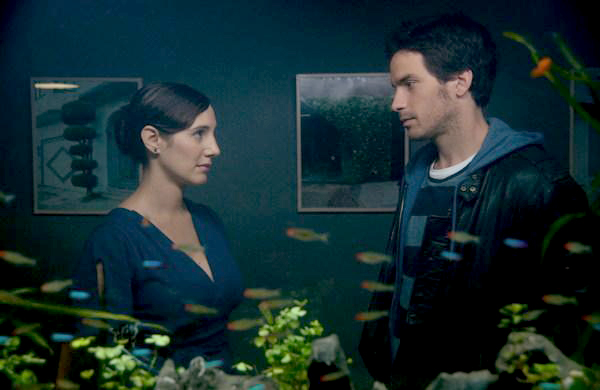|
Reviews of Recent Independent, Foreign, & Documentary Films in Theaters and DVD/Home Video

Latinbeat Film Festival 2011 Chile grabs the spotlight in this year’s edition of Latinbeat, the annual Latin American series from the Film Society of Lincoln Center, though there’s some competition, mainly from Argentina. Shot entirely in the U.S. and in mostly (broken) English, the slow-burning charmer Country Music (Musica campesina) is like a laid-back Dardenne brothers film in no hurry to reach a resolution. Alejandro, a Chilean in his mid-20s recently dumped by his American girlfriend, is stranded in the country music capital. He barely knows his Cash from his Conway, and he’s never heard of Robert Altman’s Nashville, either. Out of necessity, he has to reinvent himself—figuring out where to sleep, how to make money, and how to fit in, like learning to dance like a frat boy (fist pumping in the air). The hand-held camera roams with him during his solitary nights in cheap hotels, and at strip malls and on odd jobs during the day. Star Pablo Cerda has a sweet, self-effacing presence—casting agents, here’s a find. He has the blessed looks of a brooding, bearded, and mutton-chopped descendent from a Gustave Courbet painting. Everyone wants Alejandro—well, maybe not a straight guy scared off by his palpable neediness. He’s nothing but earnest and readily approachable, but more than a little naïve—if you’re staying in the dicey part of town, it may not be such a good idea to leave your hotel curtains open at night as you sprawl on your bed in your boxers, if you want to be alone. Made in conjunction with Vanderbilt University, writer-turned-filmmaker Alberto Fuguet’s second feature is a winning mixture of relaxed moments (Jack Daniels on the rocks poolside) and cringe-inducing encounters of miscommunication.
In at least two of the films in the program, the little guy can’t get a break. The first is set in the Argentinean city of Olavarría, “the world’s ass,” according to the film’s loquacious and scalding narrator. Pudgy, bitter, and something of a dullard, Ernesto takes the Faustian opportunity to go back into the past and change his life in Querida voy a comprar cigarrillos y vuelvo, which translates as “Darling, I’m Going Out for Cigarettes and I’ll Be Right Back.” That’s the excuse the 63-year-old Ernesto (Emilio Disi) gives to his lumpy wife before he leaves a café and is transported first to 2001 to relive pivotal moments of the last decade: Big Brother, 9/11, and Gitmo, too. The dry comedy becomes the nightmarish inversion of Forrest Gump and catnip for pessimists everywhere. Its message of things-are-bound-to-stay-the-same is depressing, and oddly reassuring. From Mexico, Acorazado (“Battleship”) makes you hunger for something you may not have thought you missed, a Cold War comedy. This political satire stings, yet it’s not mean-spirited. It helps that director Álvaro Curiel underlines his charming debut with a poppy pre-Beatles soundtrack. But most crucially, the film’s funny, with a very strong sense of timing. It begins with Silverio (Silverio Palacios) adrift on a file of sticks in the middle of a sea, wearing only his underwear and having the first of his mental meltdowns—a diminutive King Lear raging against the elements. (His rotund wife calls him a “lazy dwarf.”) In his case, a blank stare really signifies only a blank stare, but pretty much everyone in the film is subject for lampooning. Even President Obama’s 2008 presidential campaign slogan of “Yes, we can” takes on new meaning. The focus of the first half-hour is all over the place until Silverio sets sail from Veracruz towards the Florida Keys, leaving behind unemployment, his nagging family, and his tranny girlfriend. But really, he’s running away from himself. The film then gains a tighter focus when, shall we just say, he falls short of his destination. The wounds from Pinochet’s overthrown of the Allende government are still oozing in The Death of Pinochet. Many filmmakers frame a talking-head interview so that the subject looks straight into the lens at the viewer (Errol Morris’s Tabloid, for example). Directors Bettina Perut & Ivan Osnovikoff aim for the opposite effect, shooting close-up—way close up—on the mouths of four Chileans, two proudly espousing the general’s legacy and the others joyfully celebrating the military dictator’s death in 2006. If the eyes are window to the soul, the mouth is just as much of a revelation, to an extent. The flapping lips, slithering tongues, and decaying teeth take on a monstrous appearance, to the point where they become distracting, though the heated verbal volleys are absorbing. Where was Che, a New Man (Che, un hombre nuevo) three years ago, before Steven Soderbergh’s Che came out? This chronological, country-by-country documentary overview answers a lot of questions that probably came up if you saw that 2008 four-hour epic of Communist revolutionary and military leader Ernesto Guevara. Luckily, this one is just over two hours. However, the tone’s strictly referential. The Cuban Missile Crisis, where the world faced nuclear annihilation, is dealt with in a mere minute, and the film never delves into the reasons why Guevara became alarmed by what he saw as the Soviet Union’s slide towards capitalism. What is apparent here from the trove of still photos and home movies is that he knew the power of his image. He never took a bad photo. Even without the world-famous snapshot by Alberto Korda, he was an icon in the making. At least one film in the series will have a North American release, the jaunty and whimsical Sidewalls (Medianeras), also from Argentina. Of all of the recent films tipping their hat to Woody Allen’s comedies of the 1970s—when he was, you know, funny—Sidewalls is by far the most sentimental and optimistic. The tone is also more observational than self-mocking (“Is there anything more discouraging than an empty inbox?” How true.) And in terms of editing, the pace leaves Allen way behind. It’s a lively tale of loneliness. Sleepy-eyed and ruffled web designer Martin (Javier Drolas) fears the city. Crowds and enclosed spaces terrify store window decorator Mariana (Pilar López De Ayala). Both are more than mildly attractive; they’re movie wallflowers—she looks like actress Elizabeth Reaser. The neuroses of these two easy-going, thirtyish shut-ins are not the only Allen link. Both separately and simultaneously watch, and cry over, his Manhattan (1979). The question hovering over the vignettes is not whether but when these neighbors will finally meet. The script refuses to make that easy. Those wary of Hollywood endings, or those more prone to Allen’s later work (Vicky Christina Barcelona), probably should stick to Querida voy a comprar cigarrillos y vuelvo. In the
meantime, if you aren’t in New York, or if none of these films arrives
anywhere near you, you still have the option (via Netflix) of catching two exceptional Latin American films released
earlier this year that couldn’t be further apart: the
sublime and subtle drama
Octubre and the zombie-fest
We Are What We Are, both by first-time directors
(definitely a trend here). Kent Turner
|


